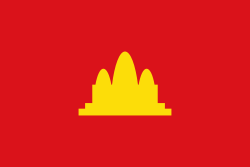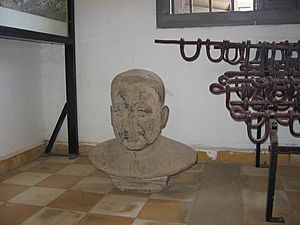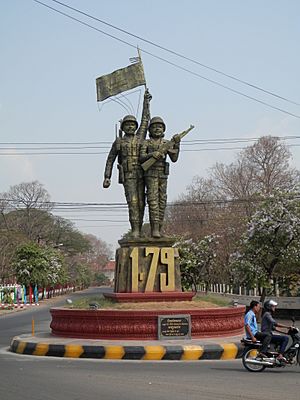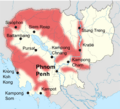Khmer Rouge facts for kids
Quick facts for kids Khmer Rouge |
|
|---|---|

The flag of Democratic Kampuchea whose design was used by Khmer guerrillas since the 1950s with the building design varying
|
|
| Active | 1951–1999 |
| Ideology | Autarky Communism (until 1981) Khmer nationalism |
| Political position | Far-left |
| Leader | Pol Pot |
| Headquarters | Phnom Penh |
The Khmer Rouge was a group of followers of the Communist Party of Kampuchea (CPK). This name was also used for the government they formed in Cambodia between 1975 and 1979. The name "Khmer Rouge" was first used in the 1950s by Norodom Sihanouk.
Contents
The Rise of the Khmer Rouge
The Khmer Rouge army grew slowly in the jungles of eastern Cambodia. This happened during the late 1960s. They received help from the North Vietnamese army, the Viet Cong, and the Pathet Lao.
Despite many bombing campaigns by the United States, the Khmer Rouge won the Cambodian Civil War. In 1975, they captured the capital city of Cambodia, Phnom Penh. They then took over the government of the Khmer Republic.
Khmer Rouge Rule in Cambodia
After their victory, the Khmer Rouge leaders included Pol Pot, Nuon Chea, Ieng Sary, Son Sen, and Khieu Samphan. They changed the country's name to Democratic Kampuchea. One of their first actions was to force people to leave the major cities.
The Khmer Rouge government was very strict. They tried to change society in many ways. For example, they wanted everyone to work on farms. Their plans for farming led to widespread famine, meaning many people did not have enough food.
They also wanted the country to be completely self-sufficient. This meant they did not want to rely on other countries for anything, even medicine. Because of this, many thousands of people died from illnesses like malaria that could have been treated.
During their rule, the Khmer Rouge caused the deaths of a huge number of people. Between 1.5 and 3 million people died, which was about 25% of Cambodia's population. This period is known as the Cambodian genocide.
End of Their Power
The Khmer Rouge government was removed from power in 1979. This happened when Vietnam entered Cambodia. The Vietnamese forces quickly defeated most of the Khmer Rouge's army.
After this defeat, the Khmer Rouge leaders fled to Thailand. Some countries, including the United States and China, supported Pol Pot and the Khmer Rouge while they were in exile. They provided them with information, food, weapons, and military training.
The Khmer Rouge continued to fight against Vietnam and the new government of the People's Republic of Kampuchea. This conflict was part of the Cambodian–Vietnamese War, which ended in 1989.
Later Years and Justice
The Khmer Rouge group mostly broke apart by the mid-1990s. They finally gave up completely in 1999.
In 2014, two former Khmer Rouge leaders, Nuon Chea and Khieu Samphan, were found guilty by a special court. This court was supported by the United Nations. They were sentenced to life in prison for their part in the terrible events that happened during the Khmer Rouge's time in power.
Images for kids
See also
 In Spanish: Jemeres rojos para niños
In Spanish: Jemeres rojos para niños






